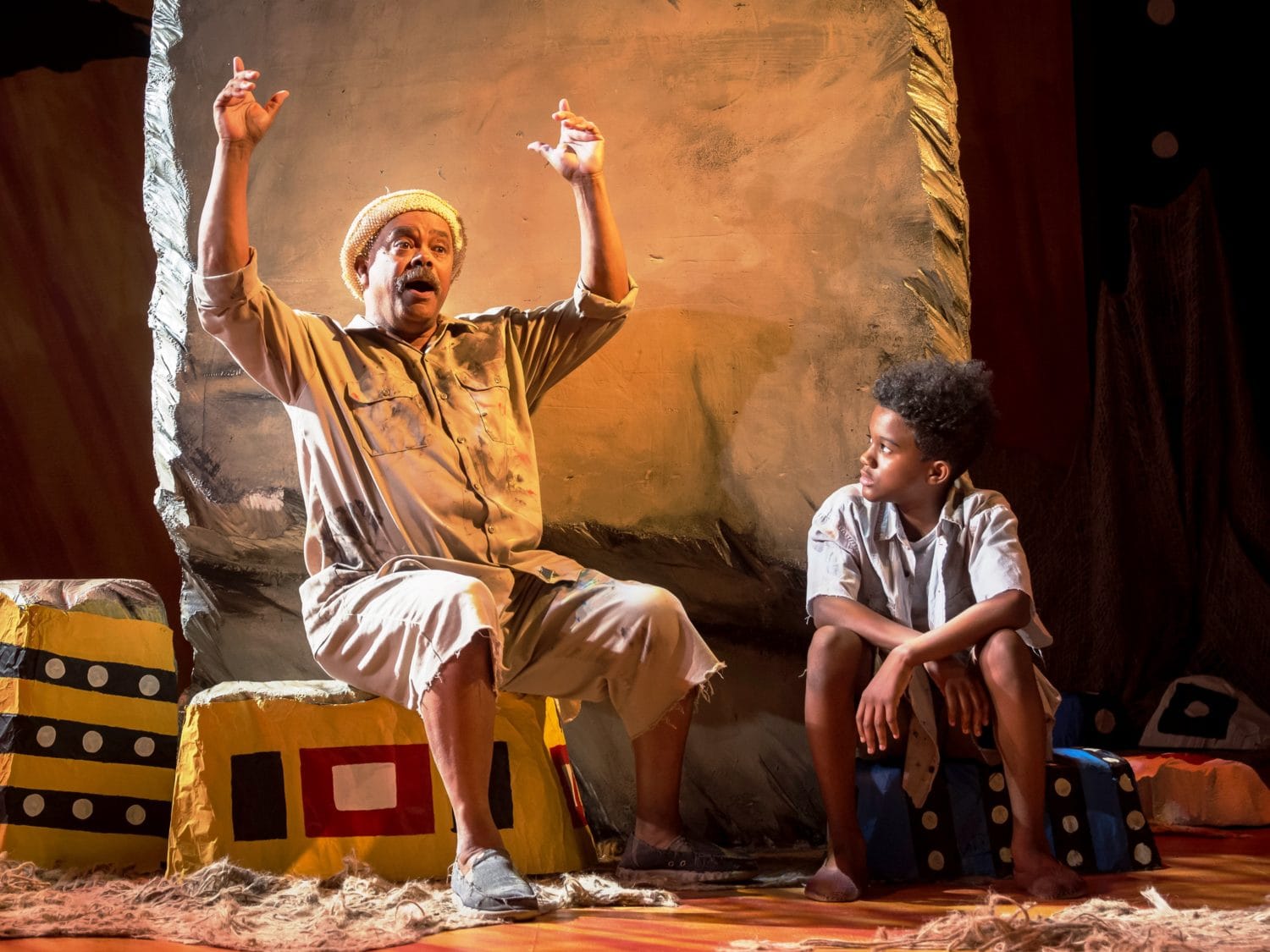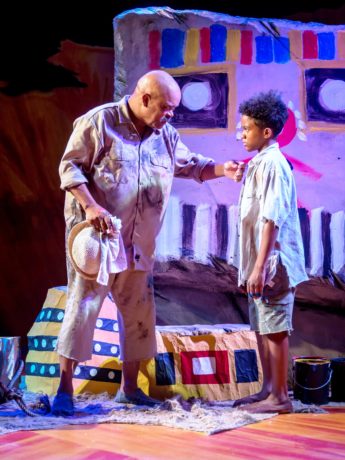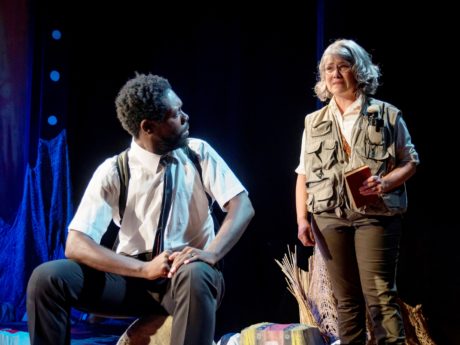There is a good, rather grim, chance that The Painted Rocks at Revolver Creek will be Athol Fugard’s last play; well into his eighties, Fugard has wryly admitted as much in recent interviews. If that does happen to be the case, then he has given an absolutely masterful farewell to the theater and to the lingering, toxic effects of apartheid, the constant focus of the South African playwright’s long career.

The Painted Rocks at Revolver Creek tells the story of real-life artist Nukain Mabuza, a farm laborer who spent approximately fifteen years painting flowers onto rocks in the farmland he had been hired to maintain. Those paintings became somewhat notable during his lifetime, bringing tourists to the farm and attracting some (albeit small) attention from the art world.
“I want to make rock flowers.” – Nukain Mabuza
In Fugard’s fictionalized telling, Mabuza is facing his last rock, a towering stone that causes him fear. He tells his twelve-year-old assistant, Bokkie, that the stone demands too much from him; it is sending a message he has yet to fully understand. And when Mabuza finally receives that message and excitedly paints his life story onto the rock, the farm owner’s wife, Elmarie Kleynhans, demands Mabuza change his painting to match the flowers he has done elsewhere. In the second act of the play, years later and post-apartheid, Bokkie returns to the farm to restore Mabuza’s work, and is met at the site by Elmarie…in markedly different circumstances.
Alexandria’s MetroStage, which originally opened its doors in 1987 with Fugard’s Blood Knot, deserves accolades for their outstanding production. Director Thomas W. Jones II has done a wonderful job of bringing this play to life for its regional premiere.
The play involves four actors, and they are uniquely remarkable, their performances powerful. The accents appear mostly impeccable, which is important given Fugard’s devotedness to peppering his dialogue with Xhosa, Zulu, and Afrikaans words. Audiences will no doubt be impressed by the youngest actor, seventh grader Jeremiah Hasty, who assumes the role of Bokkie with the assured confidence of his veteran castmates. Much is asked of Hasty and he delivers, both in his emotionally-laden lines, and in the way he projects honest strength, sparks of anger, and desperate vulnerability, the marks of a complicated childhood.

In another production, Hasty’s performance could have stolen the show, but his castmates are simply too good. There is no individual standout because they all stand out. The first act presents us with Bokkie and Mabuza, an eccentric, lively, lovely artist who understands he’s nearing the end of his life and is in the middle of a powerful moment of reflection. Doug Brown’s portrayal of Mabuza carries a boundless enthusiasm that ripples through the audience, and the act of painting he eventually undertakes with Bokkie is mesmerizing to watch. But that enthusiasm is sharply curtailed when Elmarie Kleynhans (wonderfully played by Marni Penning) joins them.
Penning brings an unmistakable if subtle, violence to her role, a hint that is amplified in the second act when she returns and sees Bokki at the site a decade later.
At that point, he no longer wishes to be called Bokki. And Hasty has been replaced by the wondrous Jeremy Keith Hunter, who insists that Elmarie address him by his real name, Jonathan Sejake. As stated earlier, Sejake has come to restore Mabuza’s work, but the political climate has abruptly changed and (without giving too much away), he finds himself in a different situation than the one he remembers.
“They have eyes, but they do not see us.” – Nukain Mabuza
The set is sparse but stunning.
Painted boulders, created by local artist Nancy Bundy (who also painted other areas of the set) are strewn about, and Mabuza’s formidable stone sits near the center of the stage. Waving grass and weeds are projected on the back curtain, and those images inventively change from barbed wires to windswept clothesline to pouring water to faint landscapes and more as the story develops; set and projection designer Patrick W. Lord did great work.
Gordon Nimmo-Smith’s use of sound is spectacular: distant drums, hymnals, and shouts approach the actors and the audience, occasionally to the point of overwhelming, but without ever crossing over.
“A place of disgrace, of humiliation.” – Jonathan Sejake
There is much talk in the play of land ownership – this debate is, in a sense, experienced in the first act, given how Mabuza’s quiet artistic act serves as reclamation, and then passionately fought in the second. That shift of tone mirrors reality. South Africa’s revised constitution of the early nineties failed to restore land ownership to black citizens, and that question of rightful ownership influences the arguments between Jonathan and Elmarie. But their arguments extend beyond that, to Elmarie’s dread regarding the possibility of her loss of power, and the potential of violence with which that power could be seized.

This is, of course, something that has been keenly felt in America, given our debates over immigrants and minorities and women rising to positions resembling anything close to prominence. That rise is often accompanied by the harsh truths of why a rise is even necessary, and the ruling class tends to meet that truth with denial and anger and hate. It was found in the automatic repulsion of Obama, the disgust that greeted Hillary Clinton, and the subsequent movement of the “forgotten people” under Trump. Our country experienced change with the imaginary comfort of distance. Now we are on the verge of passionately, nearly violently, fighting for and against it.
Our anger seems impassable. The question isn’t whether we can reasonably disagree, but if we should even attempt to reason with starkly, cruelly opposing viewpoints. Tellingly, Fugard’s script, which explores a division greater than anything we are currently undergoing, never lacks hope.
There is a sense now that having hope is an audacious act, one that is a potential disservice. One that entertains the redemption of the irredeemable. Perhaps so, but Fugard’s play is able to wade into South Africa’s fray and stand over it, gazing down. He sees the place where these two paths converge. The river does bend.
It has been said that the best art is often a subtle or unsubtle rumination on art, and Fugard’s play is that, as well as a powerful debate about race and identity. We’re lucky to have it, and in desperate need to understand it. This South African playwright’s last work, in the hands of Alexandria’s MetroStage, is a clear signpost on a dark road. And it points to our first step forward.
The Painted Rocks at Revolver Creek plays through September 30, 2018, at Alexandria MetroStage – 1201 N. Royal Street, Alexandria, VA. For tickets, buy them at the door or purchase them online.
Running Time: Two hours, with an intermission.
E.A. Aymar is a D.C.-area novelist and columnist. His new novel, The Unrepentant, is available for pre-order now. Click HERE to learn more about it.




